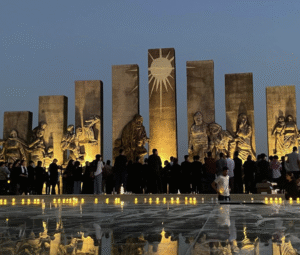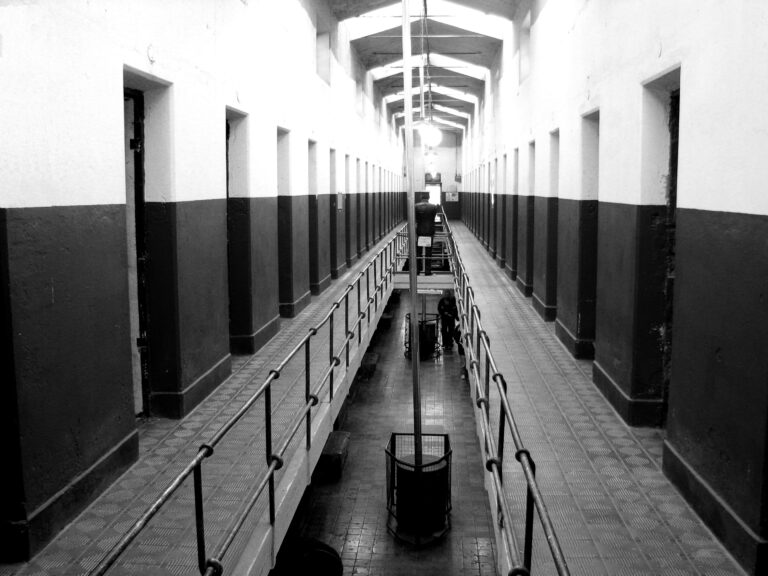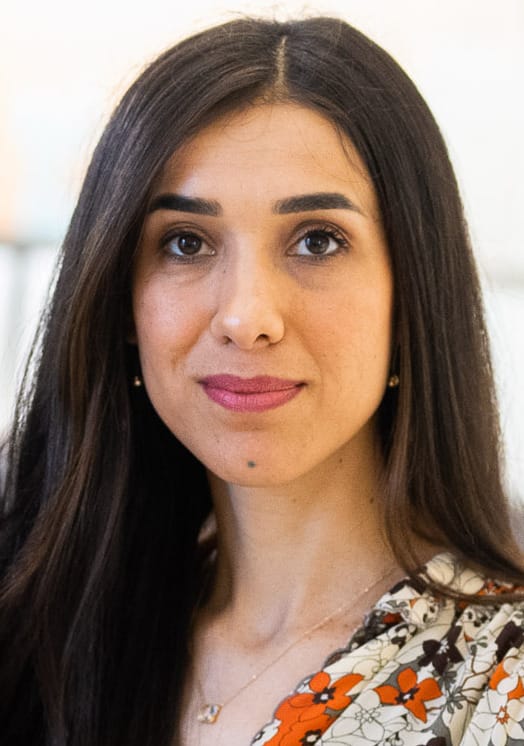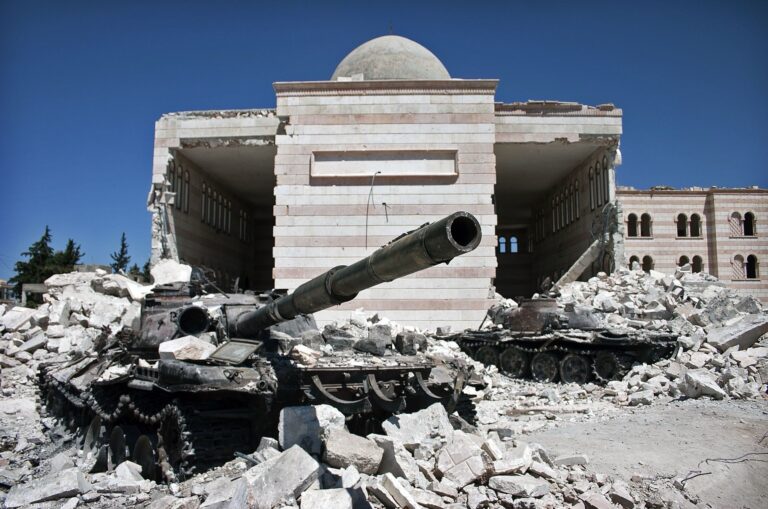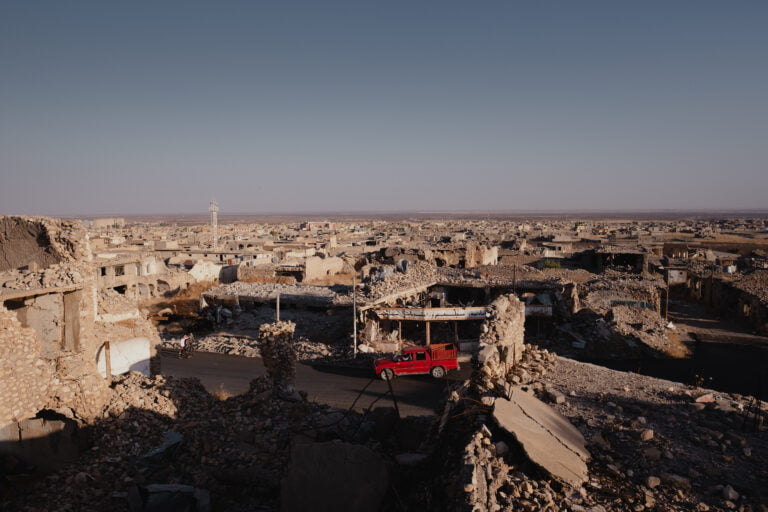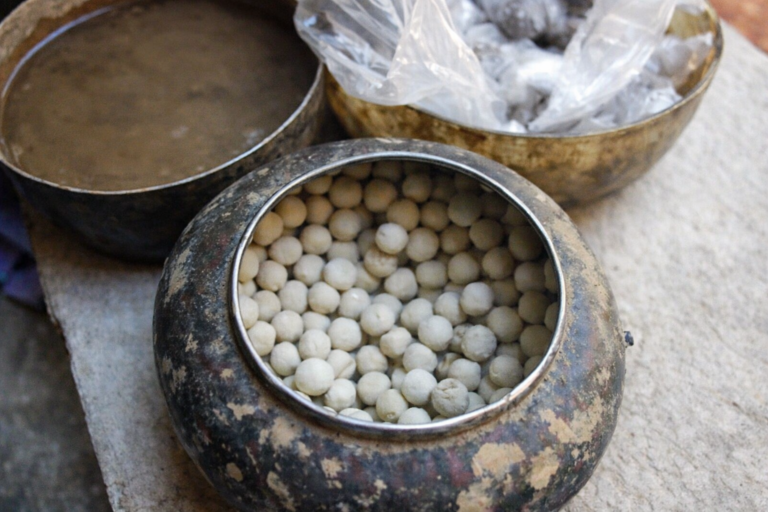During the night between August 2nd and 3rd, 2014, ISIS launched a brutal attack on the Ezidi people in Sinjar (Shingal), Iraq. What followed was a meticulously orchestrated campaign of mass murder, rape, abduction, enslavement, and forced conversion—targeting the Ezidi people simply for their identity and their ancient religion, Sharfadin. This marked the beginning of what is now recognized as the Ezidi genocide—a deeply painful chapter in the history of the Ezidi people that continues to shape their present.
The genocide tore apart families and, entire city and village communities. Thousands of Ezidi men and elderly were executed. Women and girls were subjected to horrific sexual violence, sold and resold in slave markets. Thousands of children were forcibly recruited and indoctrinated. Over 300,000 Ezidis were displaced, many still living in camps across the Dohuk and Nineveh governorates. Over 2,600 women and children remain missing to this day.
The aftermath of this genocide is far from over. Its consequences remain painfully visible, as new statistics, stories, and discoveries are added each day—constant reminders of the immense tragedy that struck the Ezidis.
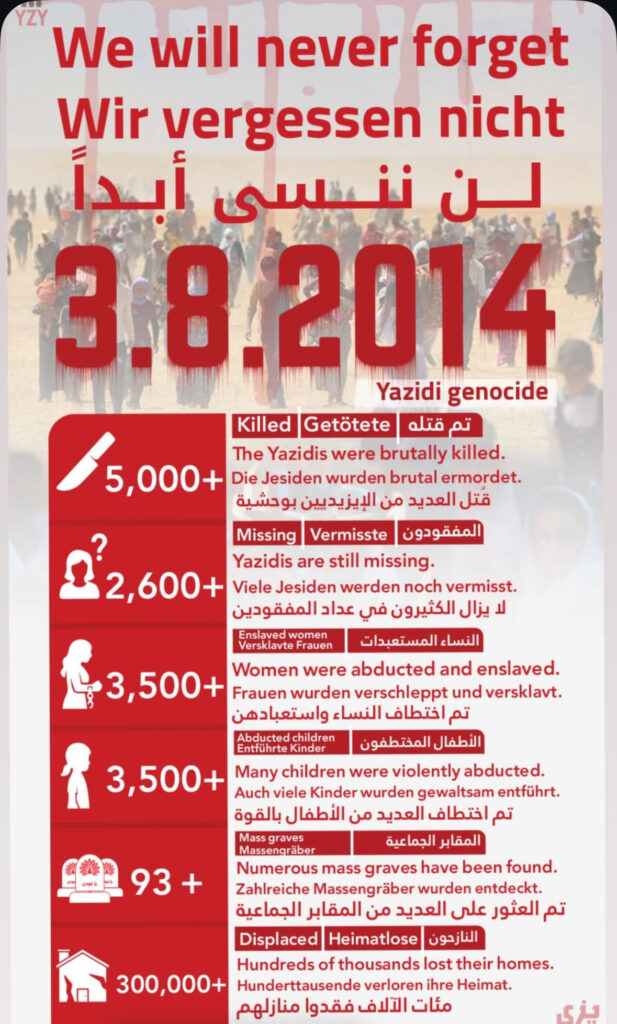
What Has Not Happened?
Despite these steps, the core wounds remain unhealed, and many essential actions are still missing:
- Lack of Justice: The vast majority of ISIS perpetrators remain unpunished. Iraq has yet to prosecute genocide-related crimes in domestic courts or to establish special tribunals dedicated to ISIS crimes.
- Security and Stability: Sinjar remains unstable, heavily militarized, and politically divided. Competing armed actors, lack of unified governance, and unresolved disputes continue to block safe return for Ezidis.
- Mass Graves Unprotected: Over 90 mass graves have been documented in the Sinjar region. Many remain unexhumed or improperly protected, leaving families in agonizing uncertainty and obstructing forensic identification.
- Missing Persons: Thousands of Ezidi women and children are still unaccounted for. The lack of an international mechanism to locate and return the missing reflects ongoing failure.
- Delayed Compensation: The promised reparations under the (Yezidi) Female Survivors Law (YSL) and other programs have not reached the majority of survivors. Bureaucratic obstacles, corruption, and insufficient political will slow the process.
Time To Act and Demand
Although remembrance is important, it is equally important for Ezidis to move beyond the suffering and demand that the Iraqi government and the international community to take real and feasible action. After eleven years of mourning, survival, and resilience, the Ezidi people have legitimate expectations.
1. Official Recognition of the Genocide by Iraq – and an End to Obstruction by Kurdish Powers
Iraq must formally and fully recognize the Ezidi genocide. It is both a moral and legal duty. However, this process has been systematically obstructed—ironically, by Kurdish political powers who simultaneously claim Ezidis as “Kurds,” yet work actively to suppress recognition and block Ezidi self-determination. This hypocrisy is not lost on the Ezidi people. Kurdish actors have also played a direct role in hindering the safe return of Ezidis to Sinjar (Shingal), maintaining political and military fragmentation in the region for their own strategic gain. This obstruction must end immediately—or it will inevitably backfire. History will hold those accountable who stood in the way of truth, justice, and healing.
2. Justice and Accountability
Iraq must prosecute ISIS members for genocide, crimes against humanity, and war crimes. The absence of domestic trials has prolonged impunity. If Iraq cannot or will not deliver justice, international mechanisms, including hybrid tribunals, must be activated. Justice delayed is justice denied.
3. Safe Return and Security Guarantees
The Ezidi people must be guaranteed the right to return home in safety, dignity, and autonomy. Sinjar must be demilitarized from non-state actors and foreign interference. Civilian governance must be restored, and infrastructure rebuilt. Continued instability is a deliberate tactic to prevent return and must be condemned.
4. Protection of Religious and Ethnic Minorities
The Ezidis are an ancient ethnic and religious people whose survival must be safeguarded. Iraq and the international community bear a legal and moral obligation to ensure protection, particularly in post-genocide contexts.
5. Reparations and Recognition of Survivor Suffering
Compensation promised under the Female Survivors Law must reach all eligible Ezidis—not just a few. Bureaucratic delays and political interference have failed survivors. Reparations must be expanded to all affected groups, including children born of rape, former child soldiers, and male survivors of torture.
6. Preservation of Ezidi Culture and Religion (Sharfadin)
Genocide targets not only people, but identity. Efforts must be made to protect and revitalize Ezidi culture, language, traditions, and the Sharfadin faith. Sacred sites in Sinjar must be restored, and Ezidi institutions empowered.
7. International Oversight and Political Pressure
The international community must stop treating Ezidis as symbolic victims and start defending their concrete rights. This includes funding reconstruction, creating mechanisms to find and return the missing, and placing real diplomatic pressure on Iraqi and Kurdish actors who stall progress.
To every Ezidi family grieving a loved one, waiting for the missing, or living with the scars of August 3rd—we stand with you, and we mourn with you.
Eleven years have passed, but the pain remains. What was taken cannot be replaced, and what is still denied—justice, truth, and return—must no longer be delayed.
At Ezidi Times, we will continue to do our part: to tell the truth, to ask the hard questions, and to be the eyes, ears, and voice of the Ezidi people—for as long as it takes.
…
For the tears of a child who saw their father taken away.
For the tears of a child who witnessed the horrors endured by their mother.
For every Ezidi child robbed of the innocence of childhood.
For every girl who bore witness to humanity’s darkest cruelty.
For every mother who lost a part of herself with each child stolen.
For every father who carried the heavy burden of helplessness.
We remember you. We hold your memory close—and we will keep telling your story until the world can no longer ignore us.


